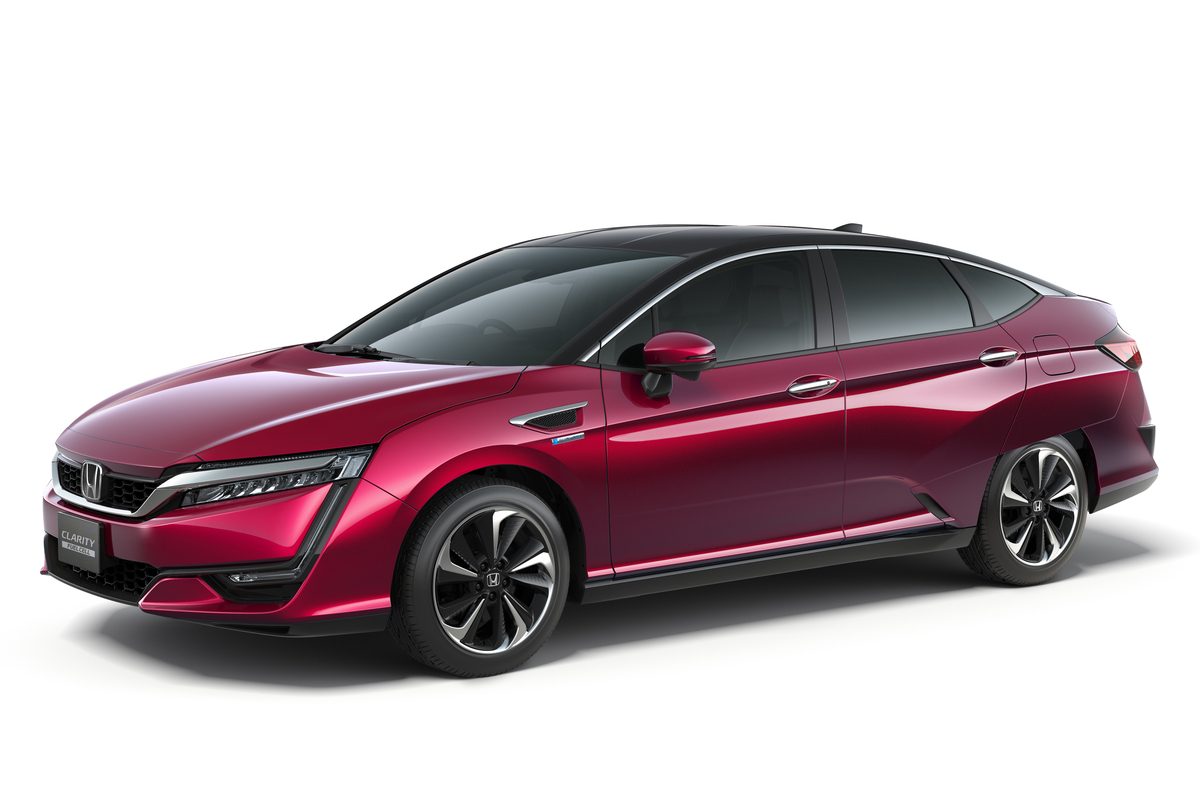News
Honda Takes Bold Step with Honda Clarity Series; Fuel Cell, Battery Electric and Plug-In Hybrid Variants to Leverage Common Platform

Apr 21, 2016 - DETROIT
- Clarity Fuel Cell gets two electrified siblings – the Clarity Electric and the Clarity Plug-in Hybrid – both launching in 2017
- New trio of Clarity vehicles provide unparalleled choices to customers through three different electric powertrain options
- All Clarity vehicles will offer spacious, five-passenger seating, premium features and interior appointments; consumers can learn more at http://www.automobiles.honda.com/Clarity
DETROIT – Honda today announced that the upcoming Clarity Fuel Cell will be joined by two additional variants, the Clarity Electric and Clarity Plug-in Hybrid, launching in the U.S. in 2017. The addition of two new Clarity vehicles, based on the same platform underpinning the new Clarity Fuel Cell, makes Clarity the first vehicle in the industry to offer fuel cell, electric and plug-in hybrid technology on one model platform, offering Honda customers an expanded array of electrified vehicle choices to suit their individual tastes and driving needs.
Following the U.S. launch of the Clarity Fuel Cell in late 2016, the Clarity Electric will go on-sale in 2017. The Clarity Electric will be the first affordable, midsize, five-passenger battery electric vehicle (BEV) to offer premium content and features. The third vehicle in the Clarity series, the Clarity Plug-In Hybrid, will launch in all 50 states later in 2017 and will be the volume leader in the series, seamlessly combining an all-electric driving range in excess of 40 miles with a hyper-efficient gasoline-hybrid extended range mode.
With elegant exterior styling, the Clarity series of vehicles will also offer spacious interiors outfitted with premium, environmentally-responsible materials and thoughtful, stylish design cues. The Clarity series will also feature advanced technologies, including Display Audio with Android Auto™ and Apple CarPlay™ as well as standard Honda Sensing™ safety and driver-assistive technology.
"The Honda Clarity Series will provide customers with a well-equipped, premium, midsize vehicle with range of ultra low-carbon powertrain options to suit their lifestyle needs," said John Mendel, executive vice president, Automobile Division, American Honda Motor Co., Inc. "This Honda trio of dedicated, advanced technology vehicles, along with the expanded application of two- and three-motor hybrid systems to our core models, represents a strong commitment to Honda's future and will help create a new volume pillar for electrified vehicle sales."
All of the Clarity models will leverage the platform that has enabled the Clarity Fuel Cell's low, wide and aerodynamic proportions and spacious five-passenger cabin. This shared platform strategy also enables flexibility in responding to infrastructure and market developments, and the ability to provide customers nationwide with an ultra-low carbon vehicle that meets their lifestyle needs while expanding the market for Honda advanced technology products. The first of the Clarity Series to launch will be the Clarity Fuel Cell, Honda's most technologically advanced vehicle ever, slated to begin deliveries to customers in select California markets in late 2016. The Clarity Fuel Cell will have a targeted monthly lease price of under $500.
Technological innovations to the Clarity Fuel Cell include a fuel cell stack that is 33 percent more compact than its predecessor with a 60 percent increase in power density compared to the outgoing Honda FCX Clarity. The more compact fuel cell and integrated powertrain, comparable in size to a V-6 engine, now fit entirely under the hood of the car, allowing for a more spacious cabin with seating for five adult passengers. The new Clarity Fuel Cell will feature an anticipated U.S. EPA driving range in excess of 300 miles, with a refueling time of approximately three to five minutes, roughly equivalent to customers' experience with gasoline refueling.
In addition to the Clarity series, a reengineered 2017 Accord Hybrid will go on-sale this spring, delivering both top-of-class power and fuel efficiency in a midsize hybrid sedan, as Honda seeks to grow sales of electrified vehicles – hybrids, plug-in hybrids, battery electric vehicles and fuel cell vehicles. On a global basis, Honda is aiming to have electrified vehicles account for two-thirds of its vehicles sales around 2030.
Customers interested in the Clarity vehicles are encouraged to visit http://www.automobiles.honda.com/Clarity where they can receive more information and sign up for the opportunity to become a Clarity Fuel Cell customer.
About Honda
Honda offers a full line of reliable, fuel-efficient and fun-to-drive vehicles with advanced safety technologies sold through approximately 1,000 independent U.S. Honda dealers. The Honda lineup includes the Fit, Civic and Accord passenger cars, along with the HR-V, CR-V and Pilot sport/utility vehicles, the soon-to-be-launched Ridgeline pickup and the Odyssey minivan.
Honda has been producing automobiles in America for 33 years and currently operates 18 major manufacturing facilities in North America. In 2015, more than 99 percent of all Honda vehicles sold in the U.S. were made in North America, using domestic and globally sourced parts.
Honda Commitment to the Environment
Based on its vision of "Blue Skies for our Children," Honda is working to advance technologies that address society's environmental and energy concerns. Honda is targeting a 50 percent reduction in its total company CO2 emissions on a global basis by 2050, compared to 2000 levels.
Honda will introduce a new 2017 Accord Hybrid and the launch of the Honda Clarity starting in 2016, which offers a hydrogen-powered Clarity Fuel Cell vehicle, followed by a new Clarity Electric and Clarity Plug-In Hybrid in 2017, as the company strives to realize significant growth in sales of electrified vehicles.
# # #
Error: You currently have access to a subset of X API V2 endpoints and limited v1.1 endpoints (e.g. media post, oauth) only. If you need access to this endpoint, you may need a different access level. You can learn more here: https://developer.x.com/en/portal/product